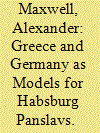|
|
|
Sort Order |
|
|
|
Items / Page
|
|
|
|
|
|
|
| Srl | Item |
| 1 |
ID:
172507


|
|
|
|
|
| Summary/Abstract |
Scholars often describe the early stages in the development of nationalism with the metaphor of “national awakening,” which originally comes from historical actors. Several scholars, notably Ernest Gellner, criticize the metaphor for its implicit teleology and essentialism. Much recent scholarship considers non-national loyalties, such as regionalism, civic pride, monarchism, or national indifference, reflecting an understandable weariness with teleological narratives. Scholars can avoid essentialist teleology by studying failed national movements. The history of “Slovak” national awakening, for example, should address Czechoslovakism and Panslavism. Despite its difficulties, however, the metaphor of “awakening” should be retained as a term of historic periodization.
|
|
|
|
|
|
|
|
|
|
|
|
|
|
|
|
| 2 |
ID:
184404


|
|
|
|
|
| Summary/Abstract |
In the early 19th century, Habsburg Panslavs sought not Russian expansion but instead linguistic and cultural unity between Slavs speaking different “dialects.” To make their vision of literary unity despite political fragmentation more persuasive, Panslavs invoked the examples of Ancient Greece and modern Germany. Greek and German examples feature prominently in the writings of Jernej Kopitar, Josef Šafařík, Jan Kopitar, and Jan Kollár, all of whom posited a single Slavic “language.” The 1848 Revolution, however, transformed Slavic literary activism: Slavs at the Prague Panslav congress understood each other only poorly, and Habsburg authorities showed a sudden willingness to use Slavic in state administration. Some Slav patriots, including Josef Podstránský, Václav Krolmus and Peter Hitzinger, focused on particularist literary work, others, such as Ľudovít Štúr and Imbro Tkalac, took an interest in the Russian literary standard. The Greek and German examples remained popular, but were invoked with different purpose.
|
|
|
|
|
|
|
|
|
|
|
|
|
|
|
|
| 3 |
ID:
066379


|
|
|
| 4 |
ID:
184403


|
|
|
|
|
| Summary/Abstract |
This article theorizes “pan-nationalism” as an analytical category in the context of nationalism theory by contrasting “pan-nationalism” with “nationalism.” What does the prefix “pan-” imply? One can identify a “multiple-statehood” criterion: pan-nationalism extends across state frontiers. Observers also use the prefix pejoratively to connote extremism or revanchism. The pejorative tendency means that the difference between “nationalism” and “pan-nationalism” may depend on the observer’s political sympathies. A brief survey of pan-Slavism illustrates a large gap between the aspirations of self-proclaimed Pan-Slavs, and the goals attributed to them. Many self-proclaimed pan-nationalists elsewhere in the world have also renounced high-political goals, thus scholars should stay close to the primary sources and exercise caution when making assumptions about pan-nationalist aspirations.
|
|
|
|
|
|
|
|
|
|
|
|
|
|
|
|
|
|
|
|
|